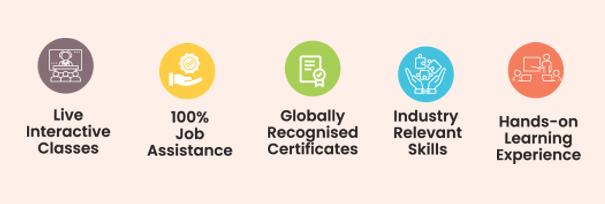The necessity for cloud computing skills has recently increased more than ever. All of the major corporations have moved to the cloud, which has reduced the amount of money invested in on-premises servers and data centers. The COVID-19 epidemic, however, compelled enterprises of all sizes to enable and support more remote, distributed workforces, which resulted in a considerable uptick in the trend toward cloud usage in recent years.
Now that the need of cloud computing has been felt more than ever lately, let us discuss some of the major skills that one would need to have if they want to build a career in the field.
However, let us start by knowing the meaning of Cloud Computing.
Meaning of Cloud Computing
Cloud computing is the delivery of computing resources that involve storage, database, networking, software, analytics, and information through the internet. Customers can access software programs, data storage, as well as additional services via the cloud rather than conventional servers located in a back office.
Customers connected to the internet technology services are able to be invoiced on the basis of usage as a result of the online computing concept. This is a departure beyond more standard subscription-based pricing models, and it is also known as a consumption-based payment model.
Did you know?
All companies use at least one public or private cloud.
Top cloud computing skills that one would want to obtain to ensure a bright career:
1. Expertise of cloud service platforms
If you want to start somewhere, it is always recommended to start learning about the CSP industry extensively. One should focus on learning about the three major public cloud computing platforms, AWS, Microsoft Azure, and GCP. IBM, Oracle Cloud Infrastructure, DigitalOcean, and Alibaba Cloud are additional businesses with cloud-based infrastructure.
To construct clouds that are both public and private products and services, organizations and CSPs alike use a variety of commonly employed open source technology channels, which include OpenStack and Apache CloudStack.
Did you know?
51% of IT spending will focus on cloud solutions rather than traditional IT tools by 2025.
2. Programming languages
The second most crucial cloud computing ability that needs to be acquired as quickly as you can is understanding of programming languages. To build, deploy, and maintain cloud-based programs professionally, you must be cmpherend to write code. So, understanding data structure ideas, such as data schemas, is necessary when developing database-powered applications.
3. Application Programming Interfaces (API)
APIs are commonly employed in the development of modern software, both in-house alongside the public cloud. APIs allow different services and applications to interact with and exchange data with other applications. It’s frequently necessary to use APIs while creating, connecting, and integrating various workloads in the cloud.
Being skilled at coding these APIs and the linkages needed to integrate workloads into the cloud is a need for cloud professionals. REST and GraphQL are the two most popular API formats utilized in the cloud.
Did you know?
More than one-third of companies, roughly around 33.4% intend to migrate from legacy enterprise software to cloud-based tools in 2023.
4. Database Management
The database is currently one of the most frequently utilized application services in the cloud. Organizations can benefit from managed services with a high level of adaptability and dependability thanks to cloud databases.
All of the top cloud service providers offer a variety of database services, namely relational databases, NoSQL databases, graph databases, and data warehouses.
5. Network Management
The next skill that the field requires from the one who wishes to make a career in cloud computing is crucial to have a solid understanding of networking fundamentals, particularly how to connect resources in different places.
A company can develop services like a virtual private cloud and secure connectivity thanks to the frequent connections between cloud resources and on-premises sites. As effective access to cloud resources is another requirement of the cloud, network management may be necessary
6. Development and operation
The age of separate silos for both developers and operational support staff to work in is long gone in today’s cloud systems. Throughout the full lifecycle of developing software and providing application services, including design, development, and production support, DevOps is the discipline of coordinating and integrating operations and development activities. With this strategy, needless bottlenecks and time to reach customers for applications are both dramatically shortened.
7. Development and operations (DevOps)
The next skill that computing cloud demands is devops, i.e., development and operations.Throughout the full lifecycle of developing software and providing application services, including design, development, and production support, DevOps is the discipline of coordinating and integrating operations and development activities. With this strategy, needless bottlenecks and time to reach customers for applications are both dramatically shortened.
8. Machine learning and AI
If one wants to have a solid career in cloud computing is machine learning and AI. The foundations of AI and machine learning should be thoroughly understood by any future experts in cloud computing. There is plenty of activity taking place in cloud systems which does not require much human interaction. The fields of artificial intelligence and machine learning are among the most highly sought after and difficult-to-find technological expertise nowadays.
All of the major open-source cloud providers provide AI and machine learning technologies that can be used to build novel features.
Did you know?
71% of companies with high cloud maturity adopt cutting-edge technology instantly and innovate aggressively.
9. Cloud security
Similar to IT sectors, security is an essential fundament in cloud computing. Security is a crucial component in all IT systems, including cloud computing platforms.
Identity and access management is a crucial cloud service, therefore being able to manage and configure it effectively is crucial. In the cloud, protecting personally identifiable information is equally crucial.
Businesses can experience irreversible reputational harm and monetary ruin if trade secrets or sensitive consumer data is lost or compromised.
10. Storage
Those searching for a steady job in the field of cloud computing solutions should grasp how to save data as well as where to retain it. Data is the cornerstone of cloud computing. Depending on its needs, the nature and amount of its data, and various other criteria, a corporation may use any or all of the following types of storage:
- self-service cloud storage
- obtainable cloud storage
- private cloud archiving
- hybrid cloud computing
11. Automation
One of the most major advantages of cloud computing is automation. It is possible to boost efficiency by programming programs to make right decisions on their own without the need for human participation. Of course, cloud specialists have a role in facilitating this type of automation. The reason cloud computing professionals need to have knowledge of automation is because it requires familiarity with the mechanics of a company’s cloud infrastructure and the various components that interact with or rely on one another.
12. Cloud orchestration
Many cloud installations rely on numerous services cooperating. At the scale that cloud computing operates, manually integrating cloud services is not an option. This is where cloud orchestration comes to the rescue.
Cloud orchestration entails automating and coordinating several complex tasks at once rather than simply one. Another important cloud skill one should have a solid grip in is the ability to effectively configure cloud orchestration.
13. Linux
There are several cloud services that are benefitted from the use of open source Linux OS. Linux is used in the cloud for containers as well as VM instances because it provides a low-cost or even free operating system on which programs and services may be deployed. Linux has benefits such as simplicity and security. Cloud specialists that can design, construct, deploy, manage, and administer Linux-based servers are in high demand.
14. Cost as well as workload management
To establish oneself as a professional in the field of cloud computing or anything in general, one should know who to manage workload as well as cost for their company. The capacity to calculate and monitor costs, as well as estimate workload, are highly regarded talents. For example, they will allow you to pinpoint whether and where certain set data restrictions are being surpassed, which might result in unforeseen costs for a firm. It also allows for the detection and removal of any features that are not being used.
15. Change management
Apart from all the skills we have talked about, another subtle yet highly impacting skill one should learn is change management. Cloud environments are extremely fluid, as compared to on-premises environments, where hardware is fixed and services might be more static. This means that the greatest cloud computing professionals are at ease working in a constantly changing environment and can keep up with changes to the underlying infrastructure, such as databases, servers, and network connections.
To learn all the aforementioned cloud computing skills, one doesn’t have to worry much. Owing to the efficiency and availability of the internet and all the resources around us, it has become way more efficient and accessible for anyone to get the knowledge of everything, including cloud computing.
Not only this, one can join best offline and online cloud computing courses that would help the aspirants to learn more and more about the subject. In addition to this, if one wants to have a cloud computing certification, colleges and institutions around us offer several courses and in-depth diplomas that would not only help one to get knowledge of it, but also several opportunities to make a career out of it






